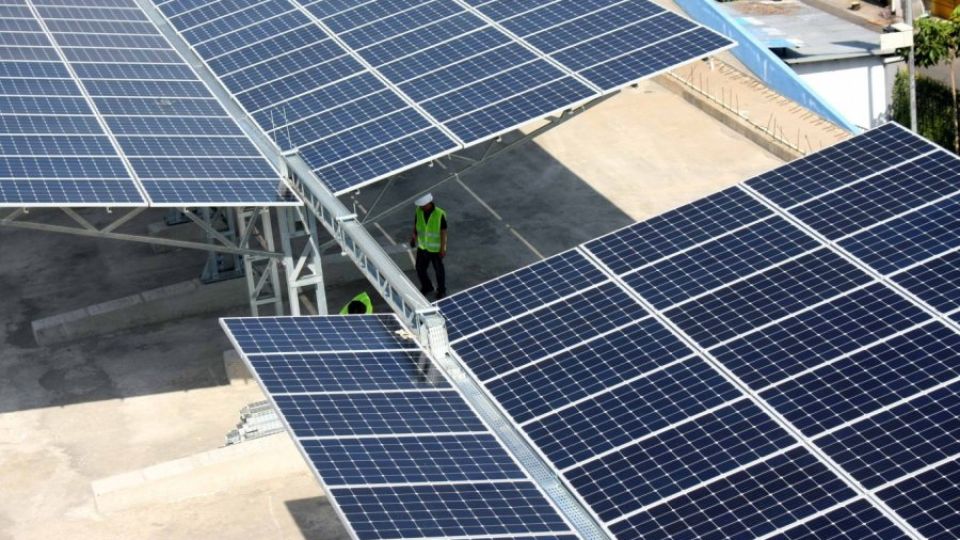March 5, 2024
JAKARTA – Arevised ministerial regulation is expected to support industrial and commercial use of rooftop solar panels, but how it is implemented will be crucial in ensuring companies can easily access the electricity generated by the installations.
Energy and Mineral Resources Ministry Regulation No. 02/2024 scraps a provision that limited the benefits owners could derive from on-grid rooftop solar panels.
The previous rules capped the amount of electricity residential, commercial and industrial customers could use from such systems at 10 to 15 percent of the installed capacity, while the rest would be fed into the grid of state-owned electricity monopoly PLN.
“There were also many uncertainties regarding the licensing process in the previous rules. In the new regulation, the government provides greater certainty by detailing the approval timeframe, the flow and the quota system,” Indonesian Solar Energy Association (AESI) executive director Fabby Tumiwa told The Jakarta Post on Tuesday.
“There needs to be an implementing rule explaining how the quota is determined and a process where the IUPTLU [electricity provider] gets feedback from developers and customers about the quota system,” he said.
However, the government would need to revise the legal framework beyond the rooftop solar regulation, such as by amending the Electricity Law and the power-wheeling regulation, to accommodate companies that are committed to using 100 percent renewable electricity, Fabby contended.
In Indonesia, companies including Coca-Cola, Danone and Unilever have pledged to use renewable energy exclusively by 2030.
“They target renewable electricity for their operations, but from what I gather, it is challenging to do so, because they’re unable to gain access to developers other than PLN,” Fabby said.
Read also: New energy rule discourages rooftop solar systems, say users
Dion Jefferson, chief commercial officer at solar panel developer SUN Energy, expects the new rules on customer electricity usage stipulated in Regulation No. 02/2024 will encourage greater industrial and commercial use but said this would ultimately depend on how the quota was set.
He urged the government to implement a transparent process for determining the quota and include a monitoring system to keep track of the remaining quota.
“The determination of the quota for PLN’s customer service implementation unit [UP3] should be based on the demand and potential of rooftop solar panel installation. We need to prevent [a situation where] areas with greater potential receive smaller quotas for whatever reason,” he told the Post on Tuesday.
Dadan Kusdiana, secretary-general of the Energy and Mineral Resources Ministry, said the new regulation sought to push larger-scale industrial and commercial use of rooftop solar panels.
“The current rooftop solar panel [regulation] is a bit difficult for households, because there is no export-import,” he explained in Jakarta on Feb. 23, referring to a flexible system allowing households to feed excess electricity into the grid or meet additional demand from the grid.
Total installed solar panel capacity reached 573.8 MW at the end of 2023, energy ministry data show, with rooftop solar panels estimated to contribute around 90 MW of the figure.
The ministry aims for the installed capacity of solar panels to reach around 770 MW this year and 3.6 gigawatts by the end of 2025.
Read also: RE100: Clean power initiative struggles to catch on in Indonesia
Marlistya Citaningrum, a sustainable energy access program manager at the Institute for Essential Services Reform (IESR), explained that the new rule eliminated the obligation for industrial users to pay parallel electricity-generation fees, including capacity fees and emergency service fees.
“This increases the appeal for industrial users,” she said, as quoted by Bisnis on Feb. 24.
However, the ministerial regulation requires commercial rooftop solar users to provide weather forecast database settings that are integrated with the Supervisory Control and Data Acquisition (SCADA) system or distribution smart grid belonging to the IUPTLU holder for rooftop solar panels with a capacity of more than 3 MW, which Marlistya expected to add to the installation cost.
“Another option is for corporations to use an off-grid system that is not connected to the IUPTLU holder’s network, with batteries or without,” Ahmad Rahma Wardhana, a researcher at Gadjah Mada University’s Center of Energy Studies (PSE UGM), told the Post on Wednesday.


